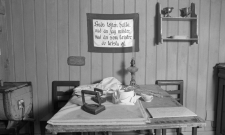Shop our historical maps
Texter
In the homes of the unemployed

May
Fabian Månsson writes in Arbetarbladet on January 25, 1906 about extortionate taxes and an "overconfident capitalist click"
The meeting was over and yours truly and a few other interested people went out to see how the unemployed were doing in their homes. The list we went by showed that to date 212 unemployed had been registered with the Unemployed Association, of whom 155 were breadwinners with about 400 small children. Of these breadwinners, not a few have been unemployed for ten weeks or more. These poor robbed creatures, who are treated more wretchedly and can be legally treated more unfairly than a horse or an ox, for one cannot refuse to care for such in winter after one has profited by his labour in summer, living for the most part in Kålhagen, Eriksberg, Sörby and Strömsbro. We decided to walk around Kålhagen, and our ciceron carefully chose just such homes, where the father is a good, well-behaved worker, and where the housewife has not yet let everything go by the wayside, but fights a desperate battle so that others will not become aware of the distress in the home, which only the closest acquaintances of the family know about. We enter one of the neat two-storey houses so common in Kålhagen. The house is well painted and the courtyard cleaned up - a casual observer would think that this was the home of well-being itself Upstairs lives a family of seven. The wife looks well-bred, lively and good, there are curtains for the windows, and by all appearances not all the bedding has yet been carried to the stump, for a crocheted bedspread lies on the bed over what we assume to be bedclothes.
People are shy about telling visitors that there is distress in the home and only through formal cross-examination do they get an idea of the true state of affairs. The man has run about everywhere looking for work, he has been within the city and beyond its limits. In the best cases a regretful refusal has been the answer, in many cases this refusal has been accompanied by a scornful speech about discontented, wasteful workers, who never know hut. Since long before Christmas he has been unemployed, and the family's only help has been a girl of sixteen, who works at a factory belonging to the president of the city council, Member of the First Chamber of the Consul J. Rettig, he, who last year thought that the allocation to the workers' pension fund was far too large. We recalled this very point and asked what the girl's weekly salary was.
There was a mumbled reply, which I first took to be 23 crowns.
- Yes, but SEK 23 a week is good money for a girl!
- No, she has 3 crowns!
Table.
- Is it possible? we ask.
- Yes, but by this sum we did not get more than two crowns and fifteen cents, for 85 cents were deducted for the factory sick fund.
Eventually it comes out that the family, despite having small children, has not seen a drop of milk in the house since Christmas Eve, that the wife has to beg from better-off friends, and that the husband's annual income in 1905 was 430 (four hundred and thirty) kronor, of which 110 went to rent for the kitchen the family occupies.
In spite of this misery, no one has turned to the poorhouse. It is a working class, which counts within itself for the most part such men, whom an antiquated poverty board has the nerve to mock by such an advertisement, which the said "board" yesterday evening placed in the organ of the antiquated - Gefleposten.
The same misery wherever you turn. A father with five children has been out of work for eight weeks. In one family we visited, the air was raw and thick enough to be cut with a knife - they cannot afford to make a fire, but have to make use of the air, which is admittedly polluted by evaporation, but is nevertheless warmed. The man had been unemployed for ten weeks. There were four children, the youngest of whom was only a little over a year old.
Here, as in the other places, you lived in a kitchen room, for which you paid 110 SEK, the rent had previously been 70 SEK but due to high taxes the rent has been raised by 40 SEK. Everything, everything the very poorest must pay in this pattern, which is brilliant for other Swedish cities, where the owners of family farms give each other raise after raise, and employ incompetent friends and friends of friends to experiment in engineering, until the residents have to go from house to house, or pass the burdens on to poor proletarians, who are tormented in a way that is not worth describing. One of the children of the family, a boy of twelve, was bewilderingly like the pictures of the famine in India, which passed through the Swedish press in those days, transparent, withered, and arrested in its progress. One of the party invited the lad to his home every day for a midday meal.
We had had enough of the misery and headed home along the streets where the lanterns were beginning to light up. One could not help feeling the viper's grin in one's teeth as one passed the lighted floors, where the crowns shone and where many of them now moved, honoured and proud, who had been fed and made rich by plucking from the poor wretches we had just visited, crown after crown of the fruits of their labour.
Subscribe to YouTube:
If you appreciate Allmogens independent work to portray our fine Swedish history and Nordic culture, you are welcome to buy something nice in the shop or support us with a voluntary donation. Thank you in advance!
Support Allmogens via Swish: 123 258 97 29
Support Allmogens by becoming a member
Support Allmogens in your will








